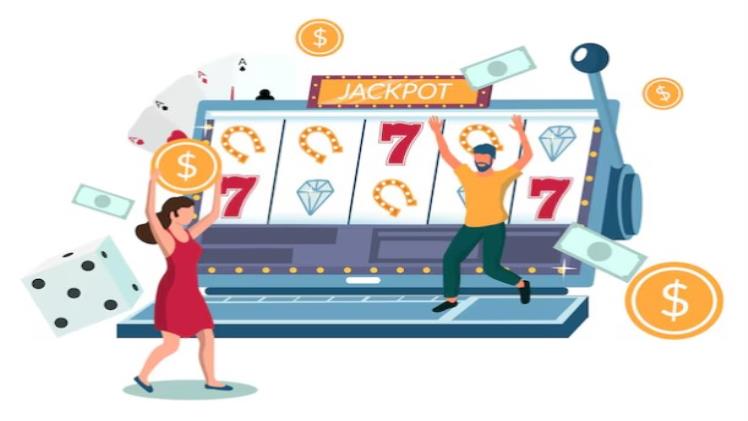Online slot machines have become one of the most popular forms of entertainment in the world of online gambling. Whether you’re a seasoned player or someone just exploring the excitement of spinning the reels, it’s easy to get caught up in the thrill. But have you ever wondered why they are so captivating? The psychology behind online slots plays a big role in making them so addictive and engaging. Let’s dive into how the design, rewards, and other psychological factors make online slot games irresistible.
The Allure of Winning: Understanding the Reward System
One of the main reasons people are drawn to online slot machines is the potential to win big. The brain is wired to seek out rewards, and slot machines tap into this natural tendency. When you spin the reels, your brain releases dopamine, the “feel-good” hormone, which creates a sense of pleasure. This is similar to what happens when we experience other pleasurable activities like eating or socializing.
In online slots, the randomness of the game is key to keeping players engaged. Every spin is a new opportunity to win, and the excitement of not knowing when a payout will happen can lead to hours of gameplay. Even small wins can trigger a dopamine rush, making players feel like they’re on the right track. This positive reinforcement encourages you to keep playing, hoping for the next big win.
Variable Reinforcement: The Slot Machine’s Secret Weapon
The concept of variable reinforcement plays a massive role in the psychology behind online situs slot gacor machines. This principle comes from behavioral psychology and suggests that you’re more likely to repeat a behavior if it’s rewarded unpredictably.
In online slots, you don’t always win after a certain number of spins, and the payout doesn’t follow a predictable pattern. This unpredictability builds tension and excitement. If players were rewarded after every few spins, the thrill would wear off quickly, but by offering rewards at random intervals, players are more likely to keep playing.
This is why, even after a long losing streak, you may still feel motivated to continue playing, waiting for that next win to come along. The uncertainty about when or if a reward will arrive keeps you hooked.
The Illusion of Control: How We Feel Like We Can Influence the Outcome
Another psychological factor that contributes to the addiction of online slot machines is the illusion of control. Many slot games offer features like “autoplay,” where players can set a specific number of spins to occur automatically. Even though these spins are still governed by the Random Number Generator (RNG), players feel like they have more control over the game, increasing their sense of involvement and excitement.
Some slot games also provide mini-games or bonus rounds that give players the illusion that they are influencing the outcome. These elements can make the game feel more interactive, which increases the psychological investment. In reality, however, the results are still entirely based on chance.
The Power of Graphics and Sound: Immersion and Engagement
Online slot machines are designed to be visually appealing. Bright colors, flashing lights, and eye-catching symbols are all used to make the game more immersive. The use of sound also plays a significant role. Many games use exciting, upbeat music or sound effects that play when you hit a small win or trigger a bonus round. These sounds and visuals work together to create an atmosphere that reinforces positive emotions, making it harder to step away from the game.
The visual and auditory feedback loops are so effective because they create a continuous stream of stimuli that keeps your brain engaged. The thrill of hearing the reels spin, the anticipation of seeing what symbols land, and the satisfaction of seeing flashing lights and hearing celebratory music after a win all contribute to the overall experience. These features are not just for fun; they are strategically designed to enhance your gaming experience and encourage you to keep playing.
Loss Aversion: Why Losing Feels Worse Than Winning Feels Good
Another important psychological factor is loss aversion, a concept in behavioral economics. This refers to the tendency for people to feel the pain of losing something more intensely than the pleasure of gaining something. In the case of online slots, this means that players are often more motivated to continue playing after a loss in an attempt to “win back” what they’ve lost. This can lead to a cycle of continuous play, even when the odds of winning are slim.
Slot machine designs often capitalize on this feeling by offering near-miss outcomes—where the reels stop just shy of a winning combination. These near-misses trick the brain into thinking that the win is within reach, making players more likely to keep trying. The near-miss effect taps into the desire to “chase” a win, reinforcing the behavior of continuing to play.
Conclusion: Understanding the Psychology Behind Online Slots
Online slot machines are designed with psychology in mind. Through the use of rewards, unpredictability, the illusion of control, and sensory engagement, these games tap into our natural psychological tendencies and keep us coming back for more. The next time you play, you’ll have a deeper understanding of why you feel so drawn to the game. Whether you’re in it for the entertainment or the thrill of the win, it’s clear that the psychology behind online slots plays a huge role in their popularity.
By recognizing these psychological principles, you can enjoy online slots responsibly, knowing the strategies that make these games so irresistible. Happy spinning!






